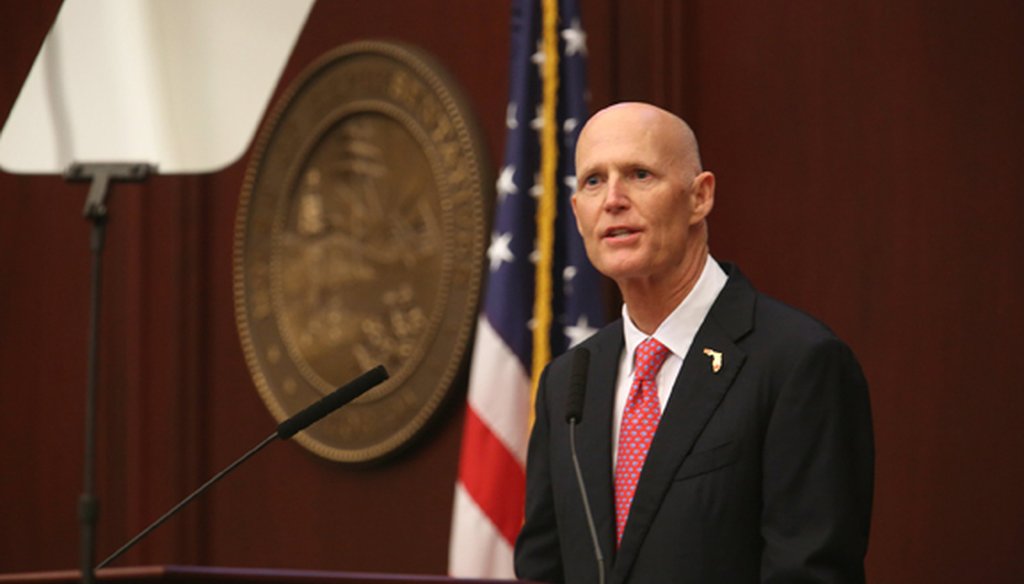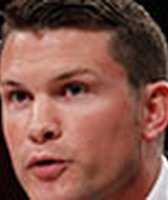Stand up for the facts!
Our only agenda is to publish the truth so you can be an informed participant in democracy.
We need your help.
I would like to contribute

Gov. Rick Scott speaks before the Florida Legislature during his State of the State address on Jan. 12, 2016. (Tampa Bay Times photo)
Florida Gov. Rick Scott kicked off the 2016 state legislative session by touting his familiar goals for growing jobs, the economy and education funding.
Scott touched on many statements during his State of the State address that PolitiFact Florida has previously fact-checked, as well as campaign promises we are tracking on our Scott-O-Meter.
Scott made no mention, however, of one of the most controversial topics the Legislature will wrestle with this year: whether to allow open carry in Florida and allowing guns on college campuses. He also avoided talking about the death penalty, which unexpectedly became a new issue for legislators just a few hours before Scott’s address when the U.S. Supreme Court ruled Florida’s death penalty system unconstitutional.
As for what he did say, here’s the PolitiFact Florida guide to its accuracy (we’ll be updating with more work as we publish it). For more of our Scott coverage, check out his full Truth-O-Meter record.
Economy
Sign up for PolitiFact texts
Scott touted Florida’s growth under his guidance, which he said was an about-face from the direction the state was headed before he took office.
"We have completely turned our economy around, and more families are thriving here today than five years ago," he said.
Economic indicators show that some factors, like job growth and unemployment, have reversed losses from previous years. But while there is more economic activity than before, incomes remain below national averages. Experts agree Scott and lawmakers can’t take much credit for changes either way, as many factors influence a state’s economy outside of individual policies.
We rated this statement Half True.
A wait list for the disabled
Scott portrayed state spending on services for disabled Floridians as solid.
"With your help, we have invested Florida taxpayer dollars to make a lasting difference in the lives of Florida families," he said during the Jan. 12 speech. "For the first time ever, we completely funded the critical needs waiting list for persons with unique abilities so they can get the help they need."
Scott is technically right about a specific waiting list for people with disabilities, but he omits important context. Namely, the critical needs waiting list is one component within a bigger waiting list for services. So we rate it Half True.
Advocates said Scott has a point about working to help around 5,000 disabled Floridians get off a narrow waiting list, but he left out two pieces of important context.
First, the critical needs waiting list is a category that Scott’s administration came up with about three years ago, so it’s not as if he had any historical competition. The state offered services to everyone on the critical needs list in 2014 and 2015, and Scott wants to do it again this year.
However, Scott omits that those on the critical needs list are a subset of the overall waiting list of about 20,000 people.
Jobs
Scott repeated a flashy accomplishment that the state has grown 1 million jobs since he took the reins. Scott will keep bragging about this figure in his nine-city, statewide bus tour called "Million Miles for a Million Jobs."
In his speech, he said, "Thanks to the hard-working people in our state, over 1 million jobs have been created in just five years since I took office."
When he first ran for governor in 2010, Scott promised to create those 700,000 on top of the 1 million jobs state economists predicted Florida would add by 2017, no matter what policies came out of Tallahassee.
The federal Bureau of Labor Statistics data shows that between the end of December 2010 and November 2015, private businesses had added 1,011,800 jobs in Florida. This neglects federal data that shows 27,300 government jobs have been lost since Scott took office. When we factor in those losses, the total jobs picture shows 984,500 net new jobs in five years, a bit less than 1 million.
We have rated his progress In the Works.
Education
The governor also reiterated his commitment to education funding in recent years.
Scott said, "We made a record high investment in our education system so every child can have the opportunity to pursue their American dream."
This is similar to a claim we fact-checked in October from Scott, who said, "We have the highest funding in (the) K-12 system in the history of the state."
The state’s total education budget was at an all-time high of $19.7 billion. But enrollment was also higher than in years past. Per-pupil spending was still below historic dollar totals and remains far below comparable levels when adjusted for inflation. We rated that statement Mostly False.
For this legislative session, Scott has proposed raising per pupil spending to $7,221. That amount is about $116 higher than 2015-16, and would put Scott above the record amount in 2007-08 under his predecessor Gov. Charlie Crist. But it comes with an important caveat: the majority of the extra funding would come through local property taxes — not state coffers.
Taxes
Scott repeatedly mentioned his push to cut taxes.
"First, we must keep doing what’s worked the last five years to help Floridians get a job and live their dreams and keep cutting taxes," he said.
Scott has asked the Legislature for $250 million for an economic development fund and $1 billion in tax cuts. The tax cuts would eliminate income taxes on manufacturing and retail businesses, reduce taxes on commercial leases, and permanently repeal sales taxes on manufacturing equipment.
If the Legislature agrees, several tax-related promises may move forward on the Scott-O-Meter.
Hear a claim during the 2016 Florida legislative session we should fact-check? #PolitiFactThis or truthometer@politifact.com.
Our Sources
See fact-checks and promise updates.





























